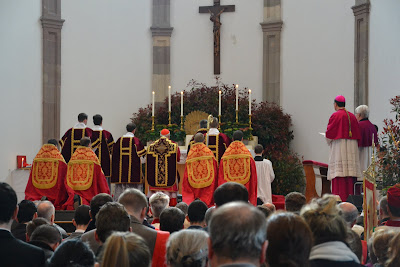Vocation discernment weekend
27-29 July 2012 in Reading:
For any English-speaking Catholic men between 18 and 35 years of age (under 18 please contact us).
Starts on Friday 27th July 2012 at 6pm (arrivals from 5pm) – ends on Sunday 29th July 2012 at 3pm.
Led by Fr Armand de Malleray, FSSP, assisted by Fr Matthew Goddard, FSSP and Rev Alex Stewart, FSSP.
Location: St John Fisher House, 17 Eastern Avenue, Reading, RG1 5RU, England.
Programme: Spiritual conferences, socials, Holy Mass each of the three days (Extraordinary Form of the Roman rite), silent prayer, and optional private talk with Fr de Malleray, FSSP. Fr de Malleray will explain what a vocation is in general and to the priesthood in particular.
Cost for the whole weekend, 2 days + 2 nights, full board: no set price for students or unemployed – any donation welcome; others: £50 suggested.
Contact: Tel: 0118 966 5284; Email: malleray@fssp.org; website: www.fssp.co.uk/england
For any English-speaking Catholic men between 18 and 35 years of age (under 18 please contact us).
Starts on Friday 27th July 2012 at 6pm (arrivals from 5pm) – ends on Sunday 29th July 2012 at 3pm.
Led by Fr Armand de Malleray, FSSP, assisted by Fr Matthew Goddard, FSSP and Rev Alex Stewart, FSSP.
Location: St John Fisher House, 17 Eastern Avenue, Reading, RG1 5RU, England.
Programme: Spiritual conferences, socials, Holy Mass each of the three days (Extraordinary Form of the Roman rite), silent prayer, and optional private talk with Fr de Malleray, FSSP. Fr de Malleray will explain what a vocation is in general and to the priesthood in particular.
Cost for the whole weekend, 2 days + 2 nights, full board: no set price for students or unemployed – any donation welcome; others: £50 suggested.
Contact: Tel: 0118 966 5284; Email: malleray@fssp.org; website: www.fssp.co.uk/england

















